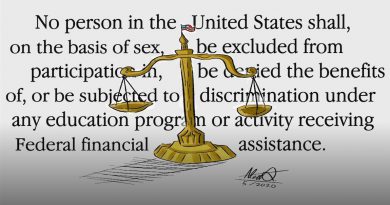Department Of Education Is Being Diminished And So Is Our Education
It is 2025, and a new administration has taken control of one of the most influential organizations that affects students nationwide—the United States Department of Education.
While changes in the federal government may seem routine for most students, President Donald Trump’s administration has promised to eliminate the department.
The DOE provides many benefits that my peers and I have relied on throughout our academic careers. As students, we must be aware of the department’s role in our lives and the potential impact its removal can have.
In the U.S., education is primarily a state and local responsibility while the DOE plays a supportive role. It sets educational standards, provides resources and holds schools accountable.
The department also promotes equal access to education by enforcing anti-discrimination laws that protect students based on gender, race and disability.
However, on Feb. 17, the DOE announced, “it has terminated [more than] $600 million in grants to institutions and nonprofits … to train teachers and education agencies on divisive ideologies. Training materials included inappropriate and unnecessary topics such as Critical Race Theory; Diversity, Equity, and Inclusion; social justice activism; “anti-racism”; and instruction on white privilege and white supremacy.”
Additionally, it manages the Free Application for Federal Student Aid—the application for federal financial aid. Annually, it distributes billions of dollars to students, schools and other academic programs through pell grants, loans and work study opportunities.
Those resources help middle and low-income students receive an equal and affordable education. Millions of students rely on that aid to get a higher education that would otherwise be out of reach.
With the current administration actively declaring war on the DOE, we must ask: “What happens if the department is abolished?”
Dismantling the department would significantly disrupt the educational system. Its duties would most likely be redistributed among federal agencies or legislative areas of the state or local governments, and some programs might be scrapped altogether in the name of government efficiency.
This shift from federal to state or local government would be chaotic. All administration of FAFSA and the distribution of federal aid could be disrupted.
The lack of federal oversight would weaken civil and special education rights, especially in states where unsupportive laws are already being enforced.
Eliminating the DOE would give states more financial responsibility, strain academic resources and allow the private industry sector to lead. This has historically led to greater costs and less security for students.
The department plays a vital role in supporting students, teachers and schools. If dismantled, its absence would be widely felt.
At the very least, redistributing its authority among multiple agencies and lower levels of government would create uncertainty and complications throughout the education system.
As students, we must stay informed about policy changes that could affect our education.



